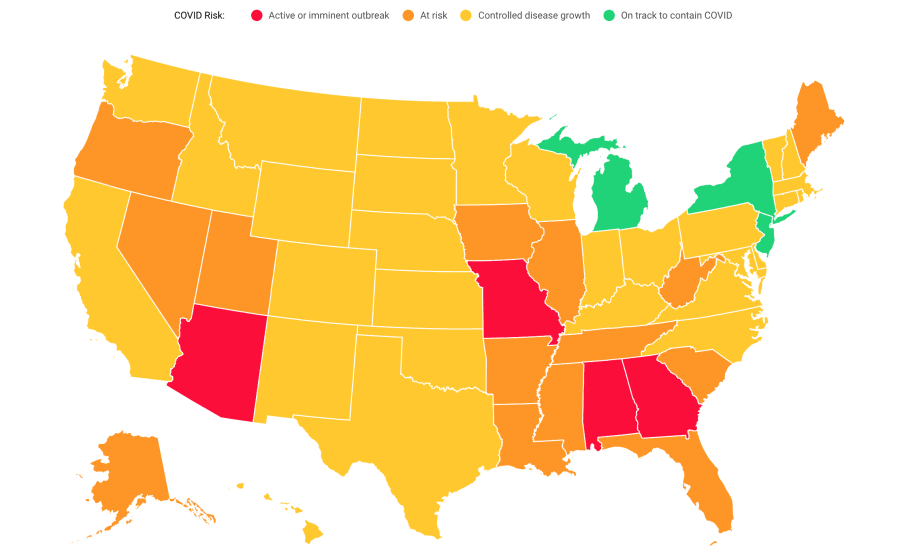The hard work Michigan officials and residents have done to prevent the spread of the coronavirus (COVID-19) has been paying off -- especially according to data from Covid Act Now.
The group of technologists, epidemiologists, health experts, and public policy leaders are identifying each state’s risk level for the spread of COVID-19. According to their model Michigan is now “on track to contain Covid” and has a low “Covid Risk Level,” according to a tweet shared Tuesday.
Recommended Videos
#Michigan has moved to green on our COVID Warning Dashboard, indicating that they are on track to contain COVID.
— Covid Act Now (@CovidActNow) June 16, 2020
Cases are steadily decreasing and Michigan’s COVID preparedness meets or exceeds international standards across our key metrics. pic.twitter.com/7ZPBuETI4x
“Cases are steadily decreasing and Michigan’s COVID preparedness meets or exceeds international standards across our key metrics,” Covid Act Now said in the tweet.
Michigan, New York and New Jersey are the only states “on track to contain Covid” -- the lowest of four categories of risk -- while most of the country is experiencing “controlled disease growth” and some are at risk or face an immediate threat of the virus.

The state of Michigan was initially the third-most affected state by the pandemic, but has since moved lower in the ranks after enacting some of the most conservative restrictions in the country to prevent the spread of COVID-19.
RELATED: Michigan’s state of emergency will be extended beyond this week, Gov. Gretchen Whitmer says
According to data compiled by Covid Act Now, Michigan is experiencing a low infection rate of 0.85 -- meaning each Michigan resident infected with the virus is infecting 0.85 other people. The data also shows that the state has widespread COVID-19 testing and a significant number of contact tracers, which are both cited by professionals as vital to containing the spread of COVID-19.
If Michigan maintains its phased reopening plan, researchers say that hospitals are not expected to become overwhelmed with COVID-19 patients in the next three months. However the data shows that if all state restrictions were lifted immediately, COVID-19 hospitalizations in Michigan could spike to 60,000 by the end of July. This scenario does not seem likely, though, as Michigan Governor Gretchen Whitmer has carried out and stood by an incremental reopening plan.
MORE: Study finds Michigan governor’s aggressive coronavirus restrictions may have saved lives
Whitmer’s MI Safe Start Plan includes six phases and some of the state is currently in phase five, “containing,” and the rest of the state is expected to follow soon. Michigan officials previously divided the state into eight regions to execute reopening plans tailored to each region based on their relationship with the pandemic.
Michigan has been experiencing a significant decline in the growth rate of COVID-19 cases and deaths over the last few weeks. The state was reporting more than 1,500 cases each day at its peak in the beginning of April -- now the state reported 204 new COVID-19 cases on Wednesday, June 17 and has not had a daily case count of more than 300 since May 31.
MORE: Coronavirus in Michigan: Here’s what to know June 17, 2020
Though the spread of COVID-19 has slowed throughout Michigan, some counties are still labeled as “at risk” or experiencing an “active or imminent outbreak” according to Covid Act Now. Counties across central Michigan -- like St. Clair, Kent and Lapeer -- and along the southernmost border of the state -- like Lenawee and St. Joseph -- have a high “Covid Risk Level” and are facing an “active or imminent outbreak.” Some counties, like Wayne, Oakland and Macomb, are at a lower risk for virus spread and are experiencing “controlled disease growth.”
Gov. Whitmer addressed Covid Act Now’s graph in a press conference Wednesday, saying Michigan’s new low-risk status is “good news” but action is still required to prevent the spread of the virus.
“... Like you’ve heard me say many times in the past and you will hear me say it many times in the future: It is so important to note that this is a novel virus and there is no cure or vaccine for it yet,” Whitmer said. “We have to continue to stay vigilant. We’ve got to be flexible in order to lower the chance of a second wave and mitigate how serious that second wave is. Now we have seen what’s happened when people don’t take this seriously, we see exponential growth happening again.”
Whitmer and MDHHS Chief Deputy for Health and Chief Medical Executive Dr. Joneigh Khaldun have consistently reiterated the need to follow data trends and allow them to influence the state’s reopening plan. Other states like Texas and Arizona have experienced significant spikes in COVID-19 cases in the last week as states begin to reopen.
READ: COVID-19 in the US: Tracking states with the most cases, deaths on June 17
Click here to see Covid Act Now’s assessment of the U.S. and individual states’ COVID-19 risk levels.



